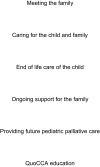Perspectives Of Health Professionals And Educators On The Outcomes Of A National Education Project In Pediatric Palliative Care: The Quality Of Care Collaborative Australia
- PMID: 31807110
- PMCID: PMC6844198
- DOI: 10.2147/AMEP.S219721
Perspectives Of Health Professionals And Educators On The Outcomes Of A National Education Project In Pediatric Palliative Care: The Quality Of Care Collaborative Australia
Abstract
Purpose: Demand for generalist health professional knowledge and skills in pediatric palliative care (PPC) is growing in response to heightened recognition of the benefits of a palliative approach across the neonatal, pediatric, adolescent and young adult lifespan. This study investigates factors that enhanced PPC workforce capability and education outcomes in metropolitan and regional areas through the integration of dedicated educator roles within specialist pediatric palliative care (SPPC) teams through a national education project.
Methods: Cross-sectional, prospective qualitative study guided by the Consolidated Criteria for Reporting Qualitative Studies. The study drew on Discovery Interview methodology and transcripts subjected to inductive thematic analysis. A convenience sample (n=16) of health professionals and educators were recruited from specialist tertiary and regional services providing PPC in Australia.
Results: Four themes emerged related to outcomes of the national PPC education project: (1) building capability in PPC, (2) developing inter-professional partnerships, (3) sustaining staff well-being, and (4) learning from children and families. Dedicated educator roles in SPPC services enhanced workforce capability through education and ongoing mentoring, built collaborative relationships between the complex network of care providers for children with a life-limiting condition (LLC) and their families, and improved quality and access to PPC. Delivery of education evolved from didactic to interactive engagement and coincided with development of a mentoring model between SPPC clinicians and generalist health and social care providers.
Conclusion: This study contributes to a growing body of knowledge on innovative and responsive mechanisms for enhancing workforce capability in PPC and provides additional evidence to support funding of dedicated educator roles in specialist PPC services.
Keywords: education; health professionals; pediatric palliative care; workforce capability.
© 2019 Donovan et al.
Conflict of interest statement
The authors report no conflicts of interest in this work.
Figures
References
-
- Sepúlveda C, Marlin A, Yoshida T, Ullrich A. Palliative care: the World Health Organization’s global perspective. J Pain Symptom Manag. 2002;24:91–96. - PubMed
-
- Mherekumombe MF, Frost J, Hanson S, Shepherd E, Collins J. Pop up: a new model of Paediatric Palliative Care. J Paediatr Child H. 2016;52:979–982. - PubMed
-
- Ahmann E, Abraham M, Johnson B. Institute for patient- and family-centered care. Emergen Med. 2010;15:109–111.
LinkOut - more resources
Full Text Sources


